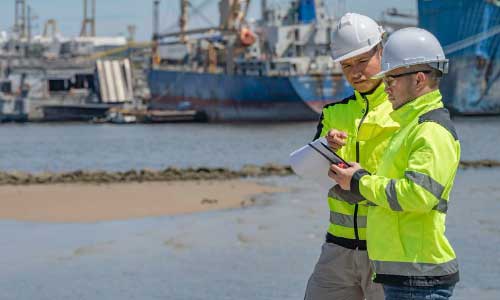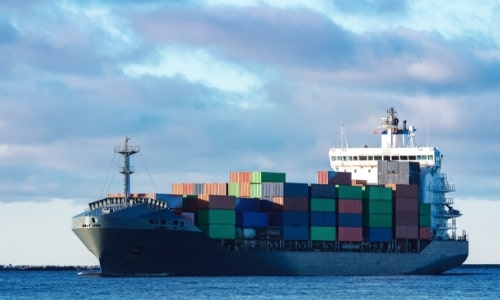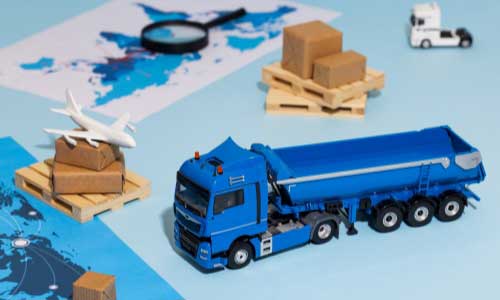Marine Insurance vs. Cargo Insurance
In global trade and logistics, marine insurance vs cargo insurance is a common comparison businesses must understand. Though both protect against transit risks, their coverage, purpose, and beneficiaries differ significantly. Let’s break down what is cargo insurance, how it differs from marine ...read more

- Best Coverage for the Lowest Price
- Quick & Hassle-free Policy Issuance
- Dedicated Teams for express Claims
Safeguard Your Business from Sea’s Uncertainties - Act Now !
What is Marine Insurance?
Marine insurance is a comprehensive policy designed to protect ships, cargo, and related transport methods against potential losses or damages during transit. It covers risks during transport by sea, air, land, and inland waterways.
Types of Marine Insurance
There are several types of marine insurance —
- Hull Insurance – Covers damage to the vessel itself
- Freight Insurance – Protects against loss of freight income
- Liability Insurance – Covers legal liabilities to third parties
- Cargo Insurance – A sub-type focused solely on goods in transit
Marine insurance is essential for shipping companies, vessel owners, and logistics providers operating in maritime environments.
Why Get Marine Insurance in the UAE?
The UAE is a global logistics hub, with major ports like Jebel Ali, Khalifa Port, and Port Rashid. Marine insurance is critical for businesses involved in —
- International sea freight
- Coastal shipping within the GCC
- Inland waterway transport
Key Features:
Marine insurance policies in the UAE are regulated by the Central Bank of UAE (CBUAE) and typically include the following:
- Protection against piracy in Gulf waters
- All-risk coverage for high-value vessels and cargo
- Customised hull and machinery insurance for fleet owners
What is Cargo Insurance?
It’s a type of marine insurance that protects the goods being transported, regardless of the transportation method: sea, air, or land. It’s usually purchased by exporters, importers, and businesses with financial interest in the cargo.
Types of Cargo Insurance:
- Single Transit Policy: Covers a specific shipment.
- Open Policy: Continuous coverage over a specific time period (ideal for regular shippers).
- Specific Voyage Policy: Tailored for high-value shipments or unique routes.
Key Features:
- Focused protection for goods.
- Customisable coverage for route, shipment value, and transport mode.
- Suitable for businesses of all sizes.
Why Get Cargo Insurance in the UAE?
Cargo insurance is widely used by UAE-based —
- Import-export businesses
- E-commerce platforms
- Freight forwarders and logistic operators
Since goods frequently travel through multimodal transport (sea + land/air), cargo insurance plays a vital role in ensuring complete end-to-end protection. Many UAE insurers offer:
- Instant policy issuance via online platforms
- Inland transit add-ons for “warehouse-to-warehouse” coverage
- Policies aligned with Incoterms (like CIF, FOB)
Marine vs Cargo Insurance: What’s the Difference?
Understanding the marine insurance vs cargo insurance distinction is crucial for effective risk management in the UAE’s dynamic logistics and shipping sector.
| Aspect | Marine Insurance | Cargo Insurance |
|---|---|---|
| Scope of Coverage | Covers ship, cargo, freight, and liabilities | Only covers goods in transit |
| Who It Protects | Shipowners, vessel operators, charterers | Exporters, importers, cargo owners |
| Risks Covered | Vessel damage, piracy, environmental liabilities | Theft, damage, or loss of goods |
| Policy Types | Hull, Freight, Liability, and Cargo Insurance | Single Transit, Open, Specific Voyage |
| Customisation | Based on vessel, operations, or routes | Based on cargo type, value, and destination |
| Mode of Transport | Mainly maritime, but can include air, road, inland waterways | All modes – sea, air, land |
To choose the right insurance for your business, it's important to understand how marine insurance vs cargo insurance differ in scope, coverage, beneficiaries, and risk protection.
Here’s a detailed comparison —
1. Coverage Beneficiaries
- Marine Insurance: Best suited for shipowners, vessel operators, charterers, and port authorities. It covers the operational and legal risks associated with maritime transportation.
- Cargo Insurance: Designed for exporters, importers, and logistics companies. It safeguards the financial value of goods being moved, regardless of the transport method.
2. Risk Coverage
Marine Insurance
Marine insurance handles a wide range of maritime risks, including —
- Storms and natural disasters
- Collisions and ship damage
- Piracy or hijacking
- Environmental and legal liabilities
Cargo Insurance
Cargo insurance is more focused, covering —
- Theft during shipment
- Damage from mishandling
- Loss during loading/unloading
While marine insurance protects vessels and operations, whereas cargo insurance ensures the goods themselves are covered during transit.
3. Customisation
- Marine Insurance: Highly customisable based on ship type, shipping route, cargo category, or specific risks like piracy or collisions. Suitable for businesses needing broad maritime coverage.
- Cargo Insurance: Offers tailored protection based on the nature, value, and destination of goods. Perfect for businesses seeking cost-effective, shipment-focused protection.
Which One Should You Choose? Marine Insurance vs Cargo Insurance
When comparing marine insurance vs cargo insurance, the right choice depends on your role in the supply chain:
- If you own ships or operate maritime businesses, go for marine insurance.
- If you’re focused on transporting goods, especially via multimodal transit, choose cargo insurance.
Understanding the difference between marine and cargo insurance helps UAE businesses safeguard their critical assets and maintain seamless trade operations.
✅ Need Help Choosing?
Policybazaar.ae offers tailored marine and cargo insurance solutions in the UAE. Whether you’re a small exporter or a fleet operator, our flexible plans ensure full protection — from port to door.
Frequently Asked Questions
Q1. Does marine insurance cover losses due to war or strikes?
Standard marine insurance usually excludes war and strike-related risks. However, businesses can purchase optional add-ons for war and strike coverage when shipping to conflict-prone regions.
Q2. What is the difference between marine liability insurance and marine cargo insurance?
Marine cargo insurance covers goods in transit against loss or damage, while marine liability insurance protects shipowners or operators from third-party claims involving injuries, property damage, or legal liabilities.
Q3. How many types of cargo insurance are there?
There are primarily three types based on transport mode: road cargo insurance, air cargo insurance, and marine cargo insurance, each tailored to cover risks specific to the transit method.
Q4. Why is it called marine insurance?
Originally, marine insurance covered goods shipped by sea during the 1600s. As trade expanded inland, insurers added coverage for land-based transit, but the term “marine” remained in use.
More From Marine Insurance
- Recent Articles
- Popular Articles







.png)




